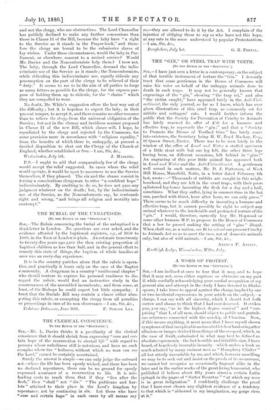A WORD OF PROTEST.
[To THE EDITOR OF THE SPECTATOR:1
Sta,—I am inclined at once to fear that it may, and to hope that it may not, seem either captions or obtrusive on my part
if, while cordially acknowledging your cordial recognition of my general aim and attempt in the study I have devoted to Shake- speare, I take leave to appeal against the charge implied by one or two incidental expressions in your article on the aubject,—a charge, I can say with all sincerity, which I should feel both sorrow and shame to think that I had ever deserved. It strikes you, you say, "as in the highest degree comical " and "sur- prising" that I, of all men, should object to public and gratuit- ous references connected with the worship of Cloacina. Now, if this means anything, it must mean that I have myself shown symptoms of that inexplicable and morbid letch or hankering after allusions or images derived from things of the cesspool, which, in the case of Swift, culminated in what may best be defined as absolute eopromania—the last horrible and infallible sign, I have heard, of hopelessly incurable insanity—which makes a book so much admired by many eminent men as " Huinphrey Clinker" all but utterly unreadable by me, and which, however unwilling we may be to seek out and insist on the proofs of its recurrence, we cannot but recognise as occasionally flagrant alike in the later and in the earlier works of the great living humourist, who published (I believe about fifty years since) a certain Latin epitaph in the pages of " Sartor Resartus " "at which my nose is in great indignation." I confidently challenge the proof that I have ever shown any slightest evidence of a tendency to that which is "abhorred in my imagination, my gorge rises at it."
With all due apology at once for the egoism of this letter, and for its other offence of an inevitably unsavoury subject, I



































 Previous page
Previous page